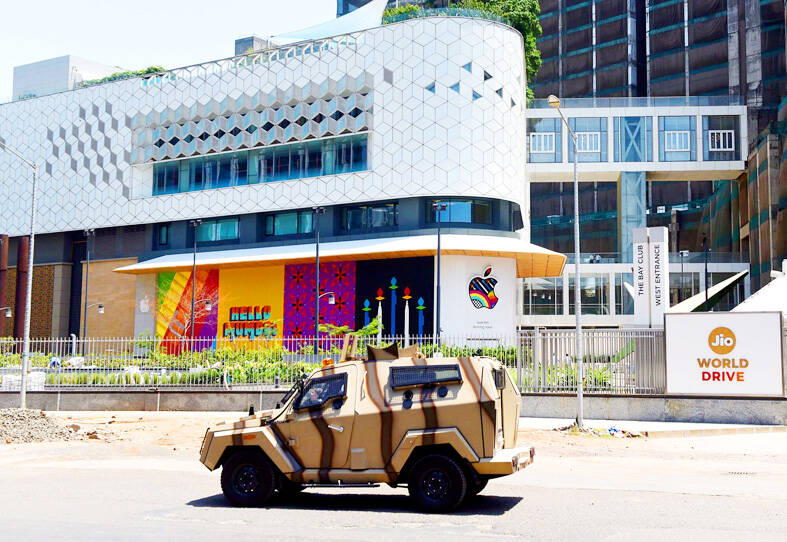Apple Inc assembled more than US$7 billion of iPhones in India last fiscal year, tripling production in the world’s fastest-growing smartphone arena after accelerating its move beyond China.
The US company now makes almost 7 percent of its iPhones in India through expanding partners from Foxconn Technology Group (富士康科技集團) to Pegatron Corp (和碩), people familiar with the matter said.
That is a significant leap for India, which accounted for an estimated 1 percent of the world’s iPhones in 2021.

Photo: Bloomberg
Apple is exploring ways to reduce its reliance on China as tensions between Washington and Beijing continue to escalate.
Its longtime partners, who make most of the world’s iPhones in sprawling factories in China, have added assembly lines in other countries at a rapid pace over the past year, the people said on the condition of anonymity.
The world’s most valuable company struggled last year with chaos at Foxconn’s main “iPhone City” complex in Zhengzhou, which drove home vulnerabilities in Apple’s supply chain and forced it to cut output estimates.
Of the total production, Apple exported US$5 billion of iPhones in the fiscal year ended last month, nearly four times as much as the previous period, the people said.
Apple is likely to manufacture the next iPhones in India at the same time as in China, sometime in the fall of this year. If so, that would be the first time that iPhone assembly begins concurrently in the two countries.
If the aggressive expansion of its suppliers continues, Apple could assemble one-quarter of all its iPhones in India by 2025.
Even before last year’s iPhone City difficulty, Apple had recognized the need to diversify its supply chain. It successfully lobbied for incentives in India and pushed suppliers Foxconn, Pegatron and Wistron Corp (緯創) to ramp up locally. The trio, which together employ about 60,000 workers in India, make models ranging from the aging iPhone 11 to the latest iPhone 14.
That has helped place Apple at the heart of India’s ambitions to become a major manufacturing alternative to China.
Apple is among the world’s most exacting when it comes to manufacturing. Its production chain encompasses hundreds of companies across the world and employs millions, much of that now in China.
The migration of iPhone production represents an economic triumph for India that could have implications for how other US brands plan their futures. For Apple, the country itself represents a fount of future growth as the Chinese economy sputters.
Apple is scheduled to open its first two retail stores in India next week, one in the financial hub of Mumbai and another in the capital New Delhi.
Apple CEO Tim Cook is scheduled to fly in to inaugurate the two stores, underscoring the domestic market’s rising importance.
Apple has also sought changes in India’s labor laws as part of its effort to expand local production and create mega factories.
Its largest contract manufacturer, Foxconn, plans to invest about US$700 million in a southern state to make phone components and possibly iPhones.
The tech industry’s reliance on China could be reduced by 20 to 40 percent by 2030, Bloomberg analysts said, adding that it could take years of investment to untangle from China’s complex, efficient and skilled supply chain.

Semiconductor business between Taiwan and the US is a “win-win” model for both sides given the high level of complementarity, the government said yesterday responding to tariff threats from US President Donald Trump. Home to the world’s largest contract chipmaker, Taiwan Semiconductor Manufacturing Co (TSMC, 台積電), Taiwan is a key link in the global technology supply chain for companies such as Apple Inc and Nvidia Corp. Trump said on Monday he plans to impose tariffs on imported chips, pharmaceuticals and steel in an effort to get the producers to make them in the US. “Taiwan and the US semiconductor and other technology industries

SMALL AND EFFICIENT: The Chinese AI app’s initial success has spurred worries in the US that its tech giants’ massive AI spending needs re-evaluation, a market strategist said Chinese artificial intelligence (AI) start-up DeepSeek’s (深度求索) eponymous AI assistant rocketed to the top of Apple Inc’s iPhone download charts, stirring doubts in Silicon Valley about the strength of the US’ technological dominance. The app’s underlying AI model is widely seen as competitive with OpenAI and Meta Platforms Inc’s latest. Its claim that it cost much less to train and develop triggered share moves across Asia’s supply chain. Chinese tech firms linked to DeepSeek, such as Iflytek Co (科大訊飛), surged yesterday, while chipmaking tool makers like Advantest Corp slumped on the potential threat to demand for Nvidia Corp’s AI accelerators. US stock

The US Federal Reserve is expected to announce a pause in rate cuts on Wednesday, as policymakers look to continue tackling inflation under close and vocal scrutiny from US President Donald Trump. The Fed cut its key lending rate by a full percentage point in the final four months of last year and indicated it would move more cautiously going forward amid an uptick in inflation away from its long-term target of 2 percent. “I think they will do nothing, and I think they should do nothing,” Federal Reserve Bank of St Louis former president Jim Bullard said. “I think the

SUBSIDIES: The nominee for commerce secretary indicated the Trump administration wants to put its stamp on the plan, but not unravel it entirely US President Donald Trump’s pick to lead the agency in charge of a US$52 billion semiconductor subsidy program declined to give it unqualified support, raising questions about the disbursement of funds to companies like Intel Corp and Taiwan Semiconductor Manufacturing Co (台積電). “I can’t say that I can honor something I haven’t read,” Howard Lutnick, Trump’s nominee for commerce secretary, said of the binding CHIPS and Science Act awards in a confirmation hearing on Wednesday. “To the extent monies have been disbursed, I would commit to rigorously enforcing documents that have been signed by those companies to make sure we get